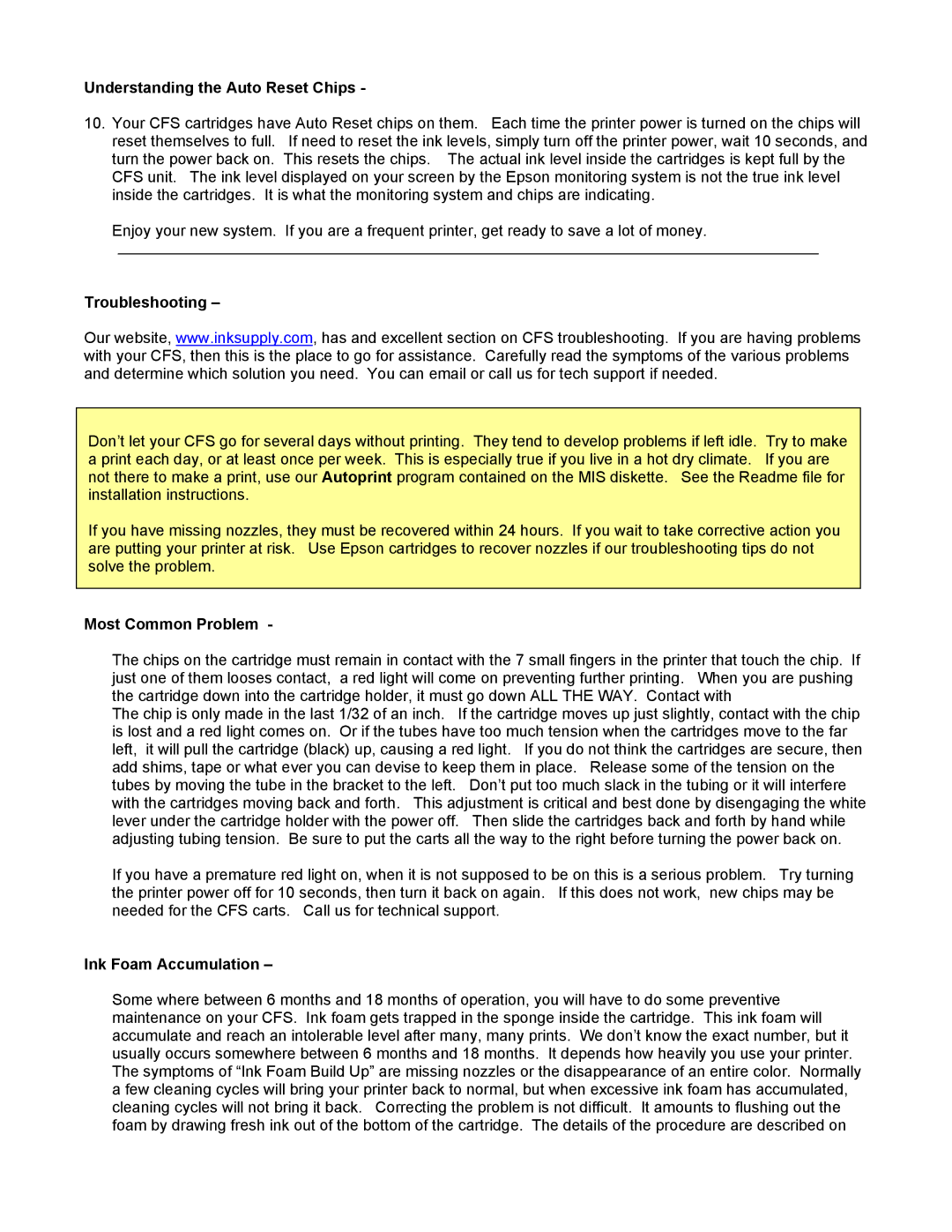
Understanding the Auto Reset Chips -
10.Your CFS cartridges have Auto Reset chips on them. Each time the printer power is turned on the chips will reset themselves to full. If need to reset the ink levels, simply turn off the printer power, wait 10 seconds, and turn the power back on. This resets the chips. The actual ink level inside the cartridges is kept full by the CFS unit. The ink level displayed on your screen by the Epson monitoring system is not the true ink level inside the cartridges. It is what the monitoring system and chips are indicating.
Enjoy your new system. If you are a frequent printer, get ready to save a lot of money.
Troubleshooting –
Our website, www.inksupply.com, has and excellent section on CFS troubleshooting. If you are having problems with your CFS, then this is the place to go for assistance. Carefully read the symptoms of the various problems and determine which solution you need. You can email or call us for tech support if needed.
Don’t let your CFS go for several days without printing. They tend to develop problems if left idle. Try to make a print each day, or at least once per week. This is especially true if you live in a hot dry climate. If you are not there to make a print, use our Autoprint program contained on the MIS diskette. See the Readme file for installation instructions.
If you have missing nozzles, they must be recovered within 24 hours. If you wait to take corrective action you are putting your printer at risk. Use Epson cartridges to recover nozzles if our troubleshooting tips do not solve the problem.
Most Common Problem -
The chips on the cartridge must remain in contact with the 7 small fingers in the printer that touch the chip. If just one of them looses contact, a red light will come on preventing further printing. When you are pushing the cartridge down into the cartridge holder, it must go down ALL THE WAY. Contact with
The chip is only made in the last 1/32 of an inch. If the cartridge moves up just slightly, contact with the chip is lost and a red light comes on. Or if the tubes have too much tension when the cartridges move to the far left, it will pull the cartridge (black) up, causing a red light. If you do not think the cartridges are secure, then add shims, tape or what ever you can devise to keep them in place. Release some of the tension on the tubes by moving the tube in the bracket to the left. Don’t put too much slack in the tubing or it will interfere with the cartridges moving back and forth. This adjustment is critical and best done by disengaging the white lever under the cartridge holder with the power off. Then slide the cartridges back and forth by hand while adjusting tubing tension. Be sure to put the carts all the way to the right before turning the power back on.
If you have a premature red light on, when it is not supposed to be on this is a serious problem. Try turning the printer power off for 10 seconds, then turn it back on again. If this does not work, new chips may be needed for the CFS carts. Call us for technical support.
Ink Foam Accumulation –
Some where between 6 months and 18 months of operation, you will have to do some preventive maintenance on your CFS. Ink foam gets trapped in the sponge inside the cartridge. This ink foam will accumulate and reach an intolerable level after many, many prints. We don’t know the exact number, but it usually occurs somewhere between 6 months and 18 months. It depends how heavily you use your printer. The symptoms of “Ink Foam Build Up” are missing nozzles or the disappearance of an entire color. Normally a few cleaning cycles will bring your printer back to normal, but when excessive ink foam has accumulated, cleaning cycles will not bring it back. Correcting the problem is not difficult. It amounts to flushing out the foam by drawing fresh ink out of the bottom of the cartridge. The details of the procedure are described on
